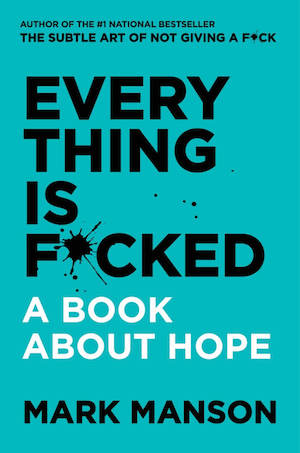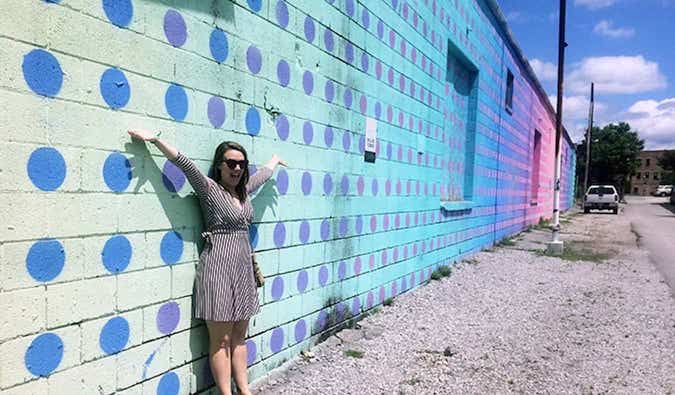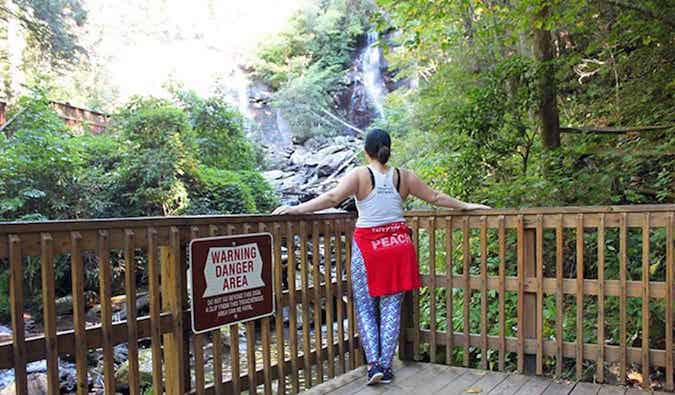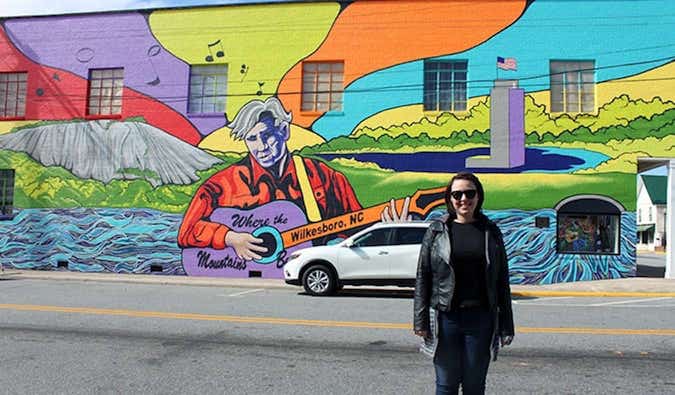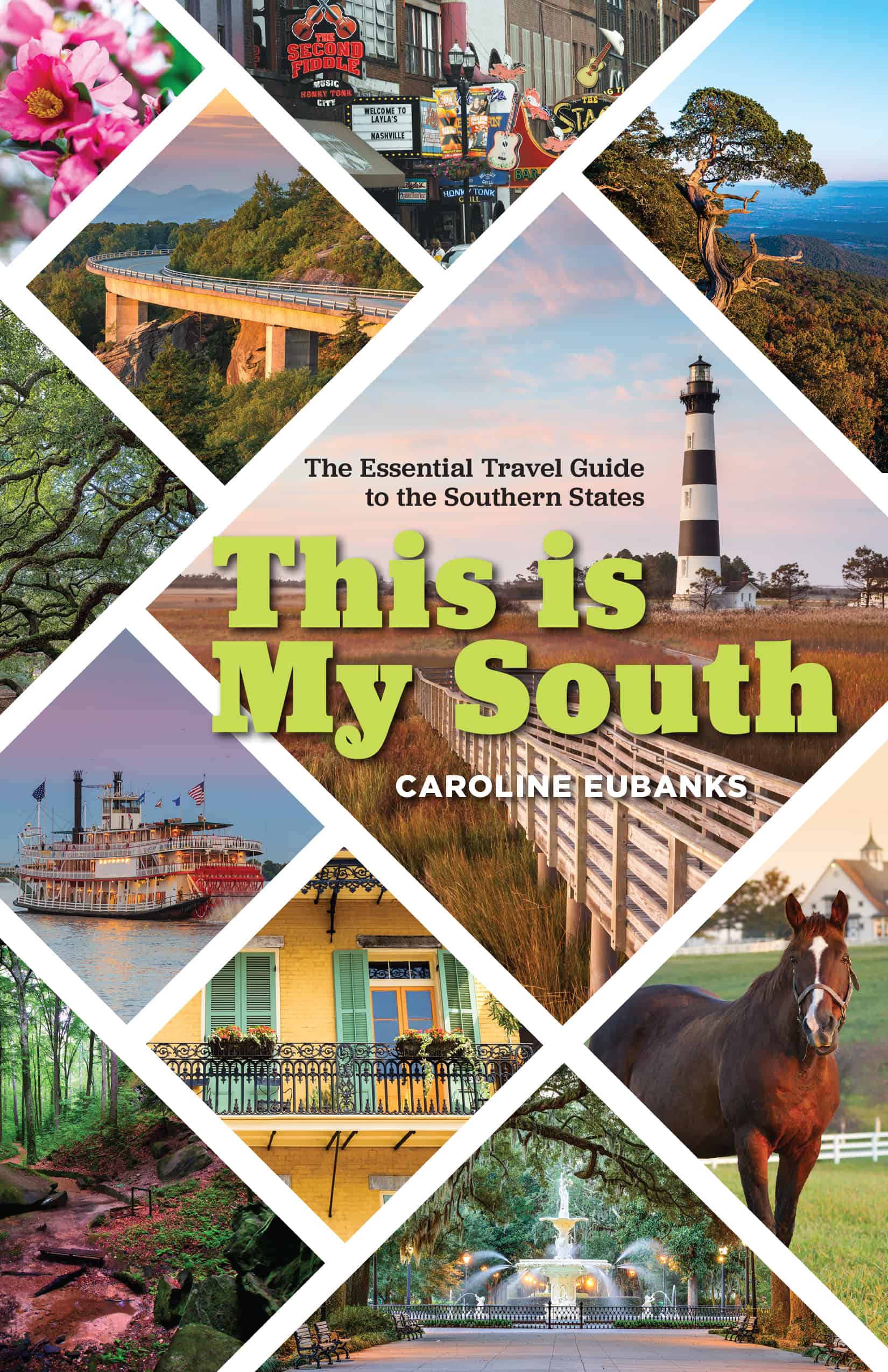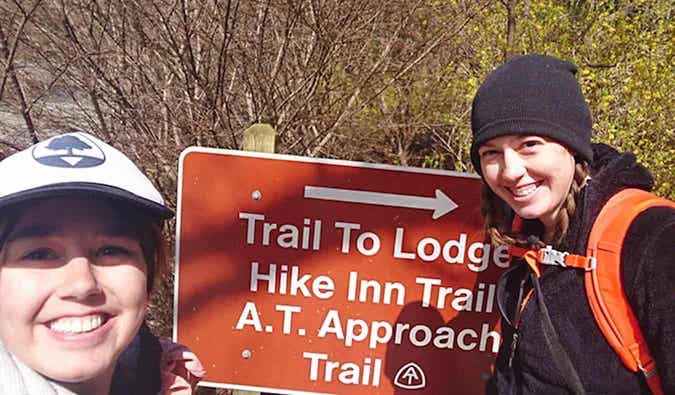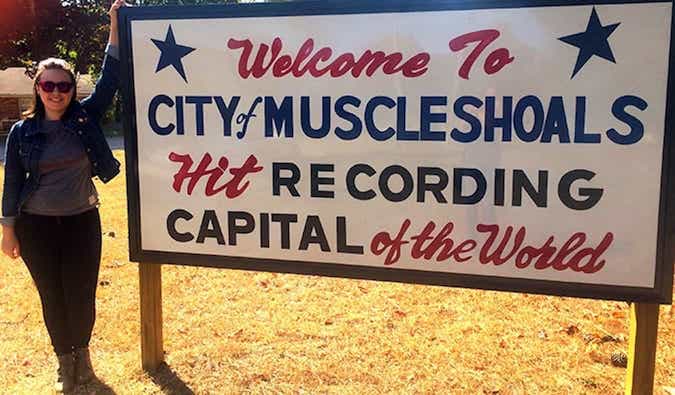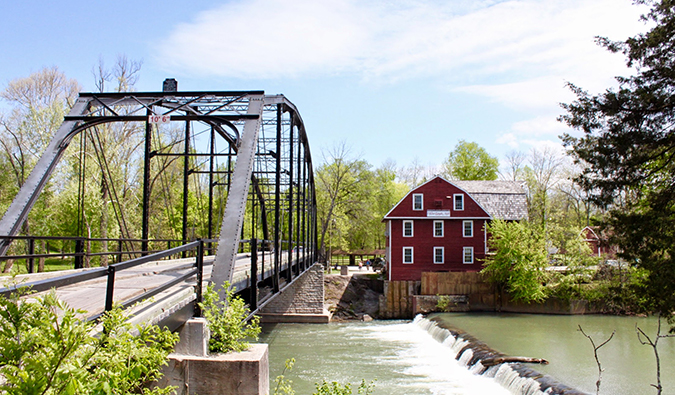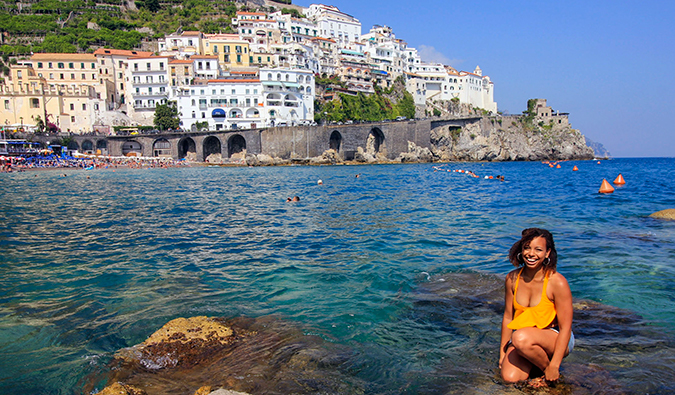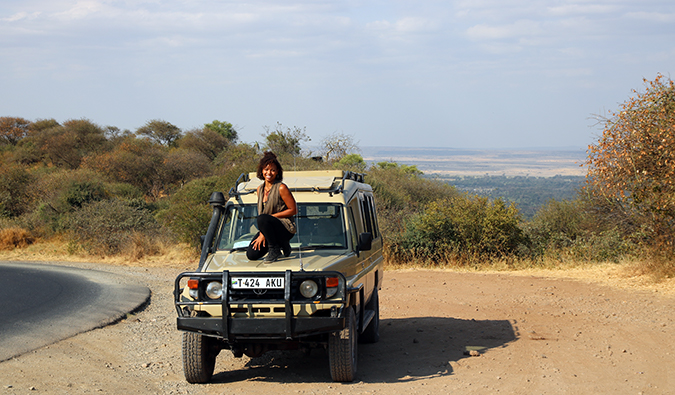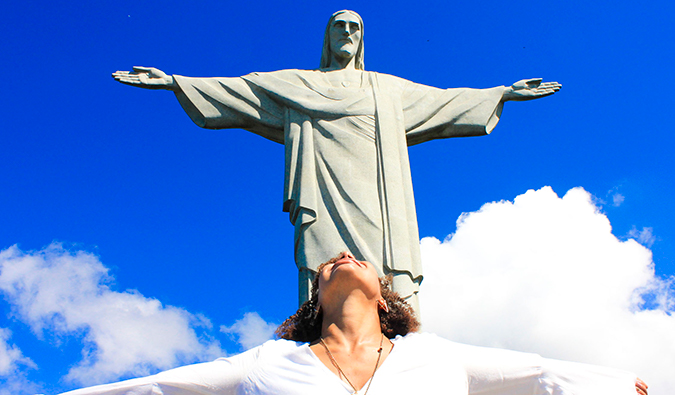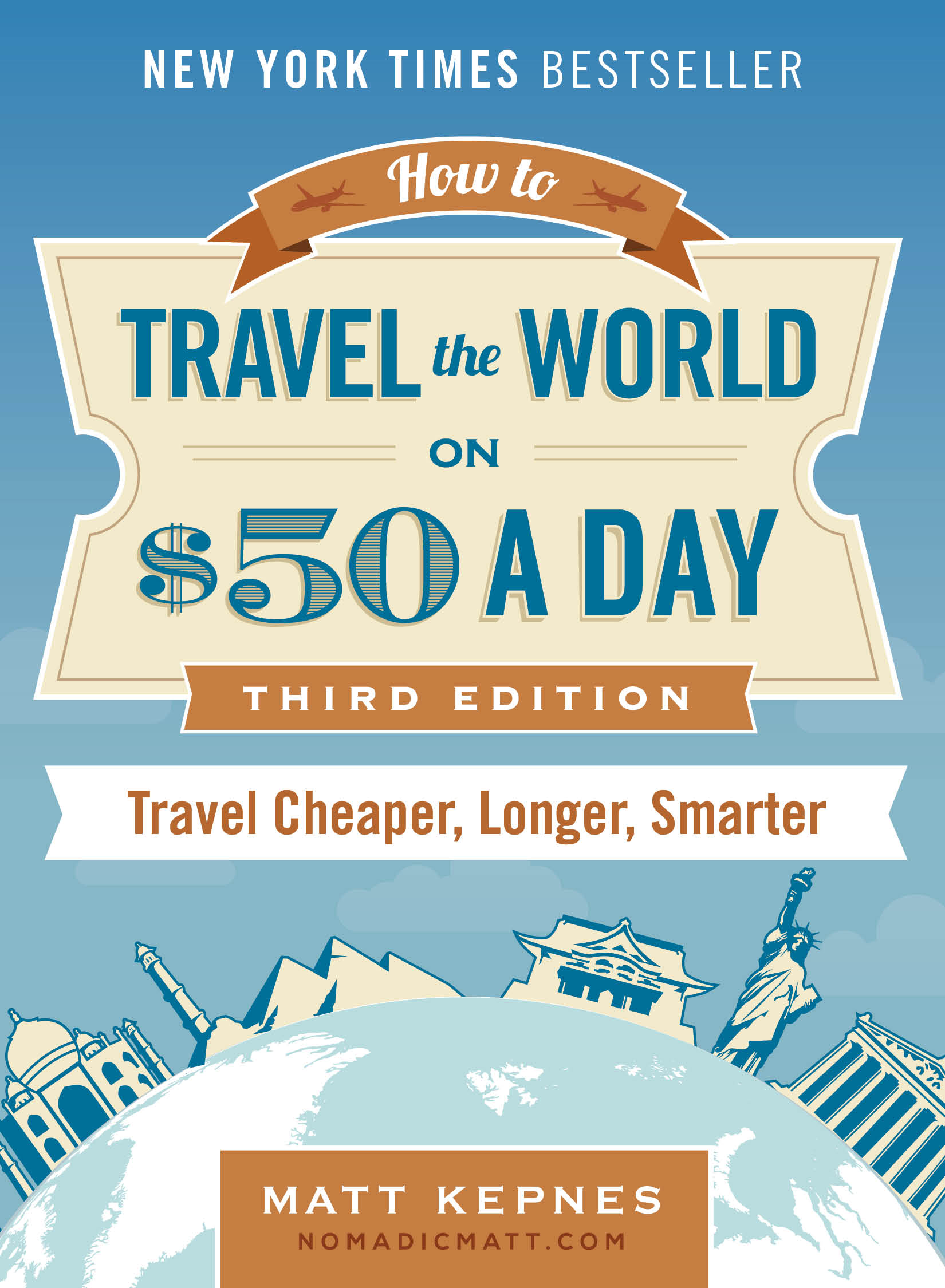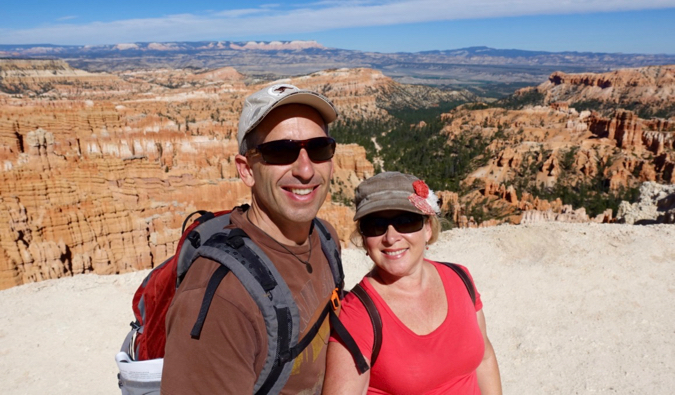
Posted: 3/7/2019 | March 7th, 2019
Over the past few years, there has been an explosion of people giving up the daily grind to live and travel in vans, RVs, and other nontraditional abodes. While traveling in an RV has been something people have been doing for decades, new sharing economy websites, better resources online, more modern vans, and a growing community that can provide support have made it easier for anyone to travel full-time in an RV.
What used to be traditionally and predominantly an activity for older, retired, or family travelers is now something people of all ages are trying to do.
One just has to look up #vanlife on social media to see!
(An aside: I hate the #vanlife movement. The faux Instagram movement does nothing for me. Just a bunch of millennials searching out that perfect sponsored photo and talking about how woke they are (for the most part)).
But #vanlife aside, RV travel is a wonderful way to see the world.
“How do you travel in an RV?” is one of the questions I’m most asked.
So today, we’re going to the experts and talking full-time RV with nomads Marc and Julie from RV Love. This couple joined my blogging program a few years ago, hoping to find a way to spread the gospel of living and traveling in an RV to the wider world. (Spoiler: they did. And they just published a book with Simon & Schuster about it too!)
They’ve been driving around in their RV for nearly five years and, today, they share their wisdom about how to travel by RV:
Nomadic Matt: Tell us about yourselves! How did you get into this?
Marc and Julie: We’re Marc and Julie Bennett, full-time RVers since 2014, living, working, and traveling in our motorhome as we explore North America and the world! We met on the dating website eHarmony while both living in Colorado in 2010, married in 2011, and hit the road three years later!
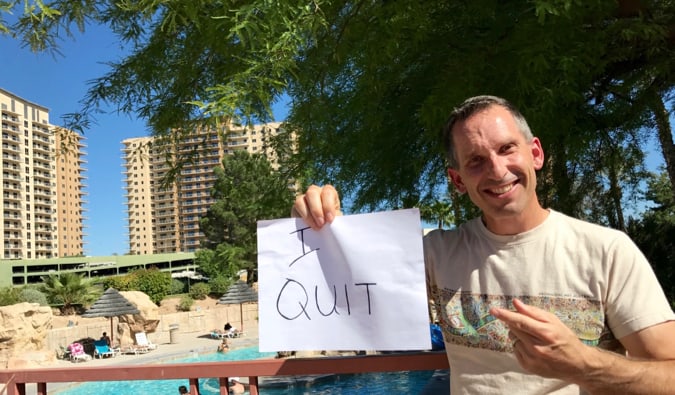
Why did you pick traveling in an RV as your way to get around?
We knew we wanted to do a lot more extended travel while we were still working. We get such little vacation time here in the USA, and we didn’t want that to limit our lives. So we started exploring different ways to bring more travel and adventure into our everyday life without Marc having to give up his job as project manager of operations, which he was able to do from home.
We considered international travel, but there were two main reasons why wasn’t a fit: the challenge of time zones, and more specifically, we wanted to travel with our dog Coda. Plus, we love to drive, so RVing was really the ideal solution for us. We love that wherever we go, we’re always home, and we’re not living out of suitcases.
We’re both passionate about driving, so it makes sense that we would choose to live and travel by RV, although we usually prefer more sporty rides when it comes to entertainment, as we both have a love for sports cars and convertibles.
What’s life like living and traveling around in an RV?
We just entered our fifth year on the road full-time as RVers, and we recently changed from a 2012 36’ gas Class A motorhome to a 1999 40’ diesel motorhome! We bucked the trend and went bigger (and older and cheaper, but much higher quality), and we’re actually doing a complete remodel of our RV this summer.
Traditionally, we spend about 80% of our time in campgrounds and about 20% dry camping, but we recently installed a big lithium battery bank and solar system on our RV, so we plan on spending a lot more time camping off the grid out in nature in the coming years. We try to spend 2-3 weeks in each location, but that varies on where we are, the weather, and what projects we have on our plates. We moved pretty fast in our first 3+ years, having visited all 50 states while still working full-time.
This year, we have so many big and exciting projects on our plates, we’re really feeling the need to slow down, catch our breath, and get caught up on our content! We tend to wing our plans a lot more than we used to, as we’re more comfortable and confident RVers now.
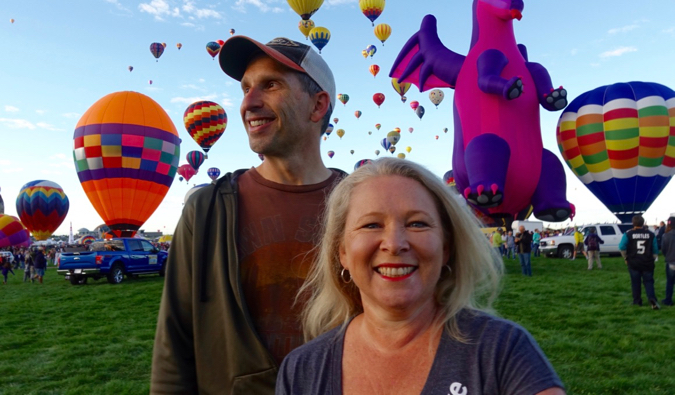
An average day depends on whether you have to work or not. We love that we no longer have a commute and that the views outside our windows change every week or so. Nature is a big part of our everyday life, so it can be easier to get in more walking, hiking, biking, or kayaking. We definitely get to see more sunsets — that’s a big thing for a lot of RVers.
RV life is still life. You need to go grocery shopping, make meals, do laundry, pay bills, and do housework. Then there’s RV maintenance and repairs! There’s almost always something to do on an RV — tighten screws, replace parts, troubleshoot issues, check your tire pressure, fix whatever’s broken.
Upon arrival at a destination, it usually takes less than 30 minutes to set up. It may sound like a hassle, but if you’re staying a week or more, it becomes a small percentage of your time. And RV life can be as social as you like. We tend to mostly stay in campgrounds, so it’s not too difficult to meet new people. And we also go to RV rallies to meet up with our RVing friends, who we stay in touch with online. It can take a little time to build your RV community, but if you put yourself out there, it can happen pretty quickly!
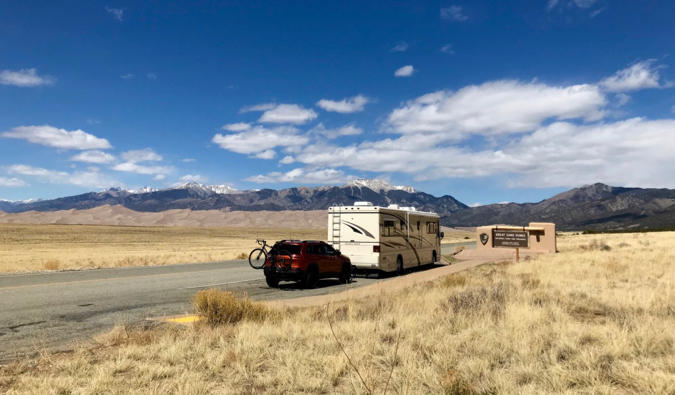
Do you need a lot of mechanical skills to do this?
When you’re traveling around in an RV, if you aren’t already handy, you’ll learn to be! It’s definitely an advantage to become somewhat mechanical and familiar with simple tools. The RVing community is very helpful and supportive when it comes to finding answers for issues you may have — whether online (in social media groups) or in person. At RV parks and campgrounds, you will usually find someone reasonably experienced and mechanically oriented nearby. If you are not skilled or it’s a complex job, you can usually find a local or mobile repair person to perform needed maintenance or repairs.
We recommend sticking with a less complex RV when starting out. The more simple the RV, the more reliable and easy to fix they are likely to be, and you can tackle many repairs yourself. As full-time RVers driving a Class A motorhome, we only need to take our RV into repair facilities 2-3 times per year on average.
Many RV repairs are fairly simple, and that’s when YouTube and Google are your friends! One of our favorite YouTube channels is the RV Geeks, who make DIY how-to videos to help you make simple repairs and upgrades. It’s often more convenient (and definitely cheaper) to do many RV repairs yourself. And you may even want to consider an extended service contract to cover your RV for repairs outside of the manufacturer’s warranty period and help limit repair costs.
Are there any personality traits you think are necessary for living in an RV?
Flexibility, adaptability, resourcefulness, and a sense of humor! Just like any other kind of travel, things don’t always go the way you want, RVs break (or break down), and travel plans go awry when you least expect it, so you need to be able to find a creative solution, often on the fly. It really helps to be handy or at least be willing to have a go at DIY fixes. RVers learn to become much more self-sufficient pretty quickly.
Anyone can RV if they really want to. It doesn’t matter about your age, life stage, relationship status, or financial situation. In our book, we share the inspiring story of 69-year-old Frieda who hit the road solo after her husband passed away and drove to Alaska to celebrate her 70th birthday. She’s been on the road for two years now and is still going strong.
Another great case study from the book is Nik and Allison (31 and 30). They share why they decided to RV and explore the country before they started a family. They follow the FIRE philosophy (Financial Independence, Retire Early) and save more than 50% of their income so Nik can be a stay-at-home dad. RVing for a year and a half while still working allowed them to do a lot of travel affordably while keeping them on track with their financial and life goals.
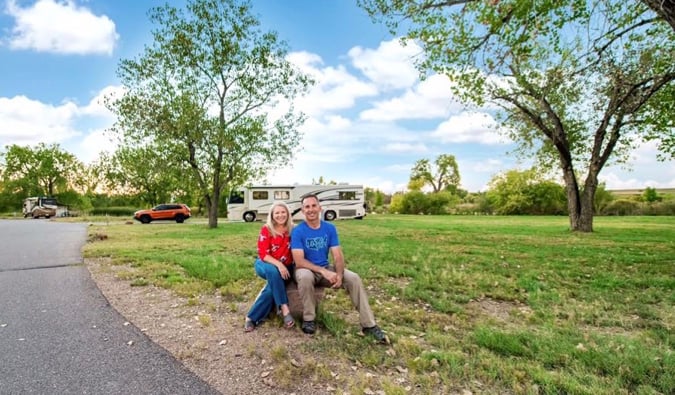
There really is no “one way” to RV, just the right way for you. That’s why, when writing our book Living the RV Life: Your Ultimate Guide to Life on the Road, we wanted to create a roadmap for people that would help them hit the road and thrive, keeping them on track with their personal goals while they’re doing it. That’s been a big part of our own success. We’re almost five years in now and still living and loving the RV Life. Now we’re showing others how they can do it too.
A lot of people are embracing RV/van life these days. Why do you think that is?
We think it’s a perfect storm of several things colliding simultaneously:
- A lot of people are questioning the traditional American Dream as a path to success or happiness — the idea of postponing your life, travels, and experiences until retirement just doesn’t really make sense, and of course, the future is promised to no one. Why not travel while you have youth and health on your side?
- Technology is enabling us to live and work from pretty much anywhere, and more companies are allowing people to work remotely, and more people are starting their own businesses.
- Then there’s social media and FOMO! With the increased awareness that RV or van life is possible through watching people’s YouTube channels, Facebook pages, and Instagram feeds, other people are beginning to realize you can travel and see cool places, and live or work in forests or by lakes — and they want to do it too. America has long been famous for iconic road trips — and RVs and van life offer the ultimate freedom: exploring the country on wheels.
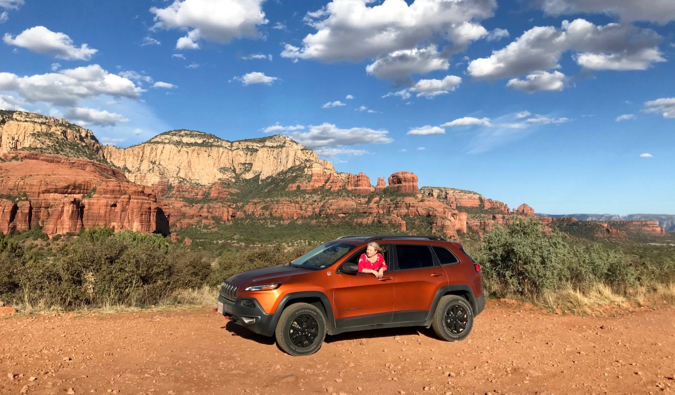
How much money will people need before they dive into RV life?
It’s a good idea to pay off as much unsecured debt as possible before hitting the road. Less debt lightens your load and allows you to really enjoy the freedoms of RV life.
It all depends on how you want to RV, and your budget. Generally, we recommend people try to save up a few months of living expenses to get started, and as a backup for unforeseen challenges and expenses. Life happens, and you just never know when you may be hit with an unexpected expense or expensive RV repair.
As a guide, as long as you plan and budget carefully, and make a good RV purchasing decision, it’s possible to RV full-time for about $2,000–$3,000 per month. Some do it for less, and others do it for way more. But across the board, we find most RVers end up spending about the same in their RV life as they did in their regular life.
Just like in traditional life, you just have to plan to live and travel within your means. Plus, your ability to earn an income while you travel is a huge factor. If you can work from the road while you RV — as was the case for us — it can be a pretty simple trade.
For example, we sold our townhome and traded our mortgage payment, HOA, utility bills, and two car payments for:
- A used RV, which we financed
- A less-expensive car that we paid cash for
- Campground and fuel expenses
What we previously spent on home repairs and maintenance for our home is now redirected to our RV. Same goes for RV insurance and roadside assistance. We tend to spend a bit more on eating out and entertainment, as we’re always on the move and experiencing new places. But it’s easy to save money by making meals in your RV, and there’s no shortage of things you can do for free, like hiking, biking, and kayaking.
Many people (like us) are able to work remotely with just an internet connection. Some work seasonally, then take a few months off to travel and explore. Other careers, like nursing, hospitality, agriculture, and construction are highly transferable to new locations, especially for seasonal work. For some lines of work, it can actually be easier to find jobs by having the ability to follow the work around the country.
We have met people who live full-time in vans or RVs frugally, for less than $20,000 per year. And we have seen others who spend well over $60,000 per year. Like all other forms of travel (and life!), expenses are variable, depending on how you do it.
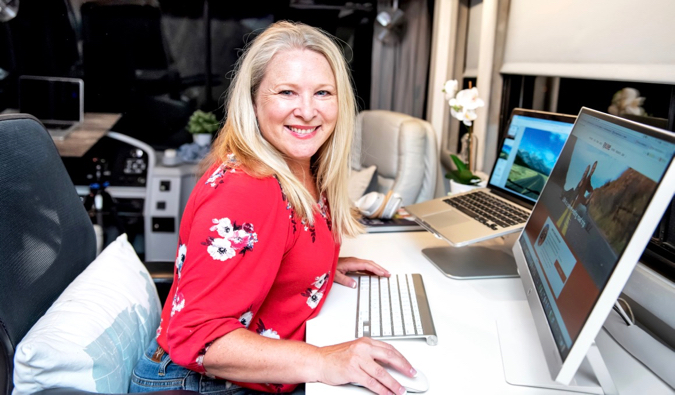
What tips do you have for people who aren’t sure what RV, van, or trailer they should get?
Buying an RV can be expensive, and buying the wrong RV can be even more expensive! Like anything with wheels, RVs depreciate (hard), and so doing your research in advance pays off. Before you even set foot on an RV dealer’s lot or go check out the RV you found on Craigslist, ask yourself:
- Who is traveling with you?
- How much do you plan to travel? (weekends, part-time, full-time)
- Where do you want to go? (campgrounds and RV parks or off-grid camping in national forests?)
Generally speaking, you’ll want to choose the smallest RV that you feel that you can comfortably live in. Smaller RVs offer more flexibility to access more places. Larger RVs are more comfortable for extended travel but will be more limiting in terms of where you can take them, especially if you want to stay in national parks and do off-grid camping.
Don’t overinvest in your first RV — it’s the one that will teach you what is most important to you and your travel style. Start out by buying used. You will avoid the steepest part of the depreciation curve. Plus, you’ll have a much better idea of what’s important to you when it comes time to buy your second RV. It’s possible to nail it with your first RV purchase, but not without a lot of research and clarity around your priorities.
What are some common pitfalls to avoid when starting out?
Full-time RVing is not a vacation, it’s a lifestyle. It’s exciting when you start. You want to go everywhere and see and do everything. Try to create a sustainable travel pace from the beginning. Stay longer in an area. It’s cheaper – in terms of fuel and campground fees – and you’ll really be able to immerse yourself, explore, and even feel like a local for a while.
Second, it’s easy for people to think they need a big RV to be comfortable, especially when coming from a bigger home. In the RV lifestyle, your environment and views are constantly changing, so your world feels a lot bigger, even if your living space isn’t. It’s easier to live in a smaller space than you might expect, especially with way less “stuff.” Remember our advice above when it comes to choosing the right RV, so you can avoid that expensive mistake.
And finally, it can be hard to resist buying gadgets and gear before you even buy your RV! Every RV has cupboards and storage of different sizes and shapes, and you won’t know what fits where until you have your RV. Save money by hitting the road with the essentials, then spend some time traveling before investing in too many upgrades or gear. You’ll want to make sure they are going to be a fit for your preferred travel style. You can always buy what you need as you go. Don’t take too much stuff! You need less than you think and can get what you need as you travel.
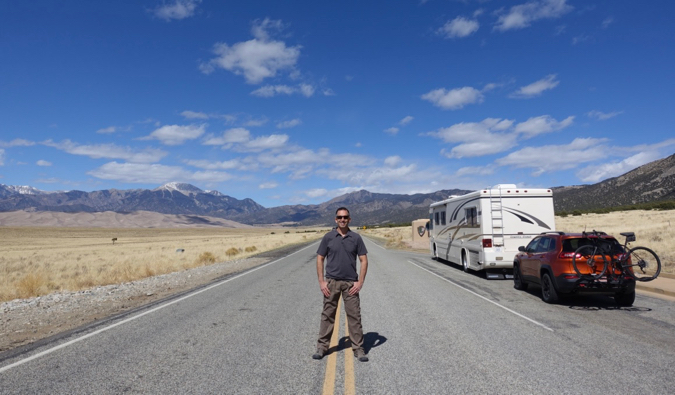
Do you have any recommended companies for vans/RVs? What about resources for finding where to camp/park?
It’s a good idea to consider renting an RV or van first, to see if you even like the lifestyle. You can rent RVs from rental companies and even from private individuals, which gives you more variety in the types of RVs you can choose from. This is really useful for helping you decide what kind of RV is right for you, before buying one. It may seem expensive, but making the wrong decision isn’t cheap either! Many large RV dealerships rent RVs, there are large rental chains like cruiseamerica.com or www.roadbearrv.com, but if you want to rent an RV from individuals for more variety, consider doing so via rvshare.com.
It is difficult to make specific recommendations about buying RVs, as there are hundreds of manufacturers, models, and types, and RVs are not like cars. The options, features, and price range of RVs vary widely. That said, we generally recommend buying a preowned RV, as they are usually more affordable, and, contrary to cars, you will generally experience fewer issues with a well-maintained preowned RV than with a brand-new unit. That’s because every RV — much like building a new house or condo — will have a “punch list” of items that need to be fixed for the first few months (or more) after you drive it off the dealer’s lot.
You can find RVs at RV dealers, on websites like RVTrader.com, as well as on Craigslist or Facebook Marketplace, and from friends and family. Local RV parks often have a community notice board of RVs for sale, too.
If you want to camp for free on public lands, there are websites like Campendium.com and Frugal Shunpiker’s Guides to find free camping areas. And there are thousands of RV parks and campgrounds around the country, which you can you find online, through apps, and in camping directories.
You can also look into camping memberships that offer discounts on your stays. For example, we spend a lot of time in a campground membership network that literally saves us thousands of dollars per year. Other websites and apps we recommend include CampgroundViews.com, Campendium, and AllStays. There are a ton out there, and you can find many more resources in our book and at our website, RV Love of course! 🙂
***
If you want more information, Marc and Julie Bennett are RVers who live, work, and travel from the road full-time, and since hitting the road in 2014, have visited all 50 USA states, plus Canada and Mexico. They are co-authors of Living the RV Life: Your Ultimate Guide to Life on the Road, and you can follow along on their journey via their website RV Love as well as their social media channels!
If you’d like to dive deep and get hands-on help on starting your own RV life, they also run online courses at RVSuccessSchool.com. As a Nomadic Matt reader, you can get 10% off their course with the code NOMADICMATT. Just input the code when you sign up!
Book Your Trip: Logistical Tips and Tricks
Book Your Flight
Find a cheap flight by using Skyscanner or Momondo. They are my two favorite search engines because they search websites and airlines around the globe, so you always know no stone is being left unturned.
Book Your Accommodation
You can book your hostel with Hostelworld, as it has the largest inventory. If you want to stay somewhere other than a hostel, use Booking.com, as it consistently returns the cheapest rates for guesthouses and cheap hotels. I use them both all the time.
Don’t Forget Travel Insurance
Travel insurance will protect you against illness, injury, theft, and cancellations. It’s comprehensive protection in case anything goes wrong. I never go on a trip without it, as I’ve had to use it many times in the past. I’ve been using World Nomads for ten years. My favorite companies that offer the best service and value are:
Looking for the best companies to save money with?
Check out my resource page for the best companies to use when you travel! I list all the ones I use when I travel — and they will save you time and money too!
The post How to Live and Travel Full-Time by RV appeared first on Nomadic Matt's Travel Site.
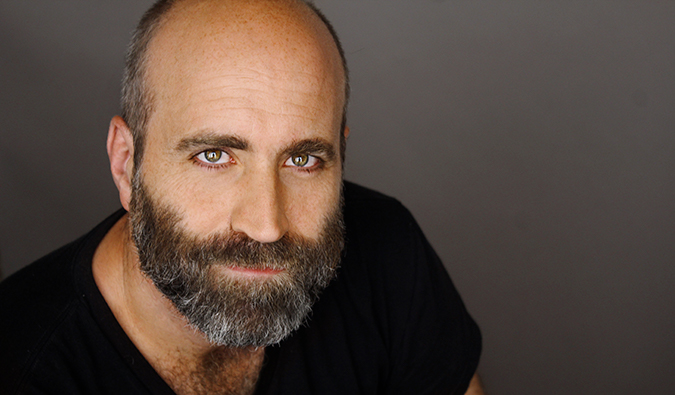 Posted: 01/27/2020 | January 27th, 2020
In 2010, I decided to spend the summer in NYC. I was two years into blogging and was making enough where I could afford a few months here. Still new to the industry, NYC was where all the legends of writing lived and I wanted to start making connections with my peers.
It was that summer I met Jason Cochran, a guidebook writer from Frommers, editor, and the man I would consider my mentor.
Though we never had any formal mentor/mentee relationship, Jason’s writing philosophy, advice, and feedback, especially on my first book, How to Travel the World on $50 a Day, has been instrumental in shaping me as a writer. Much of his philosophy has become mine and I don’t think I would have grown to where I am without him.
Last year, he finally published the book he’d been working on about tourism in America, called Here Lies America. (We featured it on our best books of 2019 list).
Today, we’re going to go behind the scenes of the book and talk to Jason on what does lie in America!
Nomadic Matt: Tell everyone about yourself.
Jason Cochran: I’ve been a travel writer for longer than I’ve felt like an adult. In the mid-‘90s, I kept a very early form of a travel blog on a two-year backpacking trip around the world. That blog became a career. I’ve written for more publications than I can count, including for a prime-time game show.
These days I’m the Editor-in-Chief of Frommers.com, where I also write two of its annual guidebooks, and I co-host a weekly radio show with Pauline Frommer on WABC. For me, history is always my way into a new place. In many ways, time is a form of travel, and understanding the past flexes a lot of the same intellectual muscles as understanding cultural differences.
So I have come to call myself a travel writer and a pop historian. That last term is something I just made up. Dan Rather made fun of me once for it. “Whatever that is,” he said. But it seems to fit. I like uncovering everyday history in ways that are funny, revealing, and casual, the way Bill Bryson and Sarah Vowell do.
What made you want to write this book?
Before I began researching, I just thought it would be funny. You know, sarcastic and ironic, about Americans going to graveyards and places of suffering just to buy lots of tacky souvenirs, eat ice cream, and wear dumb t-shirts. And, that’s still in there, for sure. We’re Americans and we like those things. Key chains will happen.
But that changed fast. For one, that would have become a very tired joke. It wouldn’t carry for three hundred pages. Things clicked for me early on, on the first of several cross-country research drives I took. I went to a place that I wasn’t taught about at school, and it clicked. I was at Andersonville in rural Georgia, where 13,000 out of 45,000 Civil War prisoners died in just 14 months. It was flat-out a concentration camp.
Yes, it turns out that concentration camps are as American as apple pie. The man who ran it was the only Confederate officer who was executed after the war. Southerners feared the victors would hang their leaders by the dozen, but that vengeance never materialized. Not for Jefferson Davis, not for Robert E. Lee—the guy who ran this camp poorly got the only public hanging. And he wasn’t even a born American. He was Swiss!
But that’s how important this place was at the time. Yet most of us have never even heard of it, except for a really bad low-budget movie on TNT in the ‘90s in which all the characters bellowed inspirational monologues as if they thought they were remaking Hoosiers.
So just getting my head around the full insanity of Andersonville’s existence was a big light bulb—our history is constantly undergoing whitewashing. Americans are always willfully trying to forget how violent and awful we can be to each other.
And Andersonville wasn’t even the only concentration camp in that war. There were a bunch in both the North and the South, and most of them had survival rates that were just as dismal. So that was another light bulb: There’s a story in why our society decided to preserve Andersonville but forget about a place like Chicago’s Camp Douglas, which was really just as nasty, except now it’s a high-rise housing project and there’s a Taco Bell and a frozen custard place where its gate once stood.
And did you know that the remains of 12,000 people from another Revolutionary War concentration camp are in a forgotten grave smack in the middle of Brooklyn? We think our major historic sites are sacred and that they are the pillars of our proud American story, but actually, how accurate can our sites be if they’re not even fairly chosen?
Posted: 01/27/2020 | January 27th, 2020
In 2010, I decided to spend the summer in NYC. I was two years into blogging and was making enough where I could afford a few months here. Still new to the industry, NYC was where all the legends of writing lived and I wanted to start making connections with my peers.
It was that summer I met Jason Cochran, a guidebook writer from Frommers, editor, and the man I would consider my mentor.
Though we never had any formal mentor/mentee relationship, Jason’s writing philosophy, advice, and feedback, especially on my first book, How to Travel the World on $50 a Day, has been instrumental in shaping me as a writer. Much of his philosophy has become mine and I don’t think I would have grown to where I am without him.
Last year, he finally published the book he’d been working on about tourism in America, called Here Lies America. (We featured it on our best books of 2019 list).
Today, we’re going to go behind the scenes of the book and talk to Jason on what does lie in America!
Nomadic Matt: Tell everyone about yourself.
Jason Cochran: I’ve been a travel writer for longer than I’ve felt like an adult. In the mid-‘90s, I kept a very early form of a travel blog on a two-year backpacking trip around the world. That blog became a career. I’ve written for more publications than I can count, including for a prime-time game show.
These days I’m the Editor-in-Chief of Frommers.com, where I also write two of its annual guidebooks, and I co-host a weekly radio show with Pauline Frommer on WABC. For me, history is always my way into a new place. In many ways, time is a form of travel, and understanding the past flexes a lot of the same intellectual muscles as understanding cultural differences.
So I have come to call myself a travel writer and a pop historian. That last term is something I just made up. Dan Rather made fun of me once for it. “Whatever that is,” he said. But it seems to fit. I like uncovering everyday history in ways that are funny, revealing, and casual, the way Bill Bryson and Sarah Vowell do.
What made you want to write this book?
Before I began researching, I just thought it would be funny. You know, sarcastic and ironic, about Americans going to graveyards and places of suffering just to buy lots of tacky souvenirs, eat ice cream, and wear dumb t-shirts. And, that’s still in there, for sure. We’re Americans and we like those things. Key chains will happen.
But that changed fast. For one, that would have become a very tired joke. It wouldn’t carry for three hundred pages. Things clicked for me early on, on the first of several cross-country research drives I took. I went to a place that I wasn’t taught about at school, and it clicked. I was at Andersonville in rural Georgia, where 13,000 out of 45,000 Civil War prisoners died in just 14 months. It was flat-out a concentration camp.
Yes, it turns out that concentration camps are as American as apple pie. The man who ran it was the only Confederate officer who was executed after the war. Southerners feared the victors would hang their leaders by the dozen, but that vengeance never materialized. Not for Jefferson Davis, not for Robert E. Lee—the guy who ran this camp poorly got the only public hanging. And he wasn’t even a born American. He was Swiss!
But that’s how important this place was at the time. Yet most of us have never even heard of it, except for a really bad low-budget movie on TNT in the ‘90s in which all the characters bellowed inspirational monologues as if they thought they were remaking Hoosiers.
So just getting my head around the full insanity of Andersonville’s existence was a big light bulb—our history is constantly undergoing whitewashing. Americans are always willfully trying to forget how violent and awful we can be to each other.
And Andersonville wasn’t even the only concentration camp in that war. There were a bunch in both the North and the South, and most of them had survival rates that were just as dismal. So that was another light bulb: There’s a story in why our society decided to preserve Andersonville but forget about a place like Chicago’s Camp Douglas, which was really just as nasty, except now it’s a high-rise housing project and there’s a Taco Bell and a frozen custard place where its gate once stood.
And did you know that the remains of 12,000 people from another Revolutionary War concentration camp are in a forgotten grave smack in the middle of Brooklyn? We think our major historic sites are sacred and that they are the pillars of our proud American story, but actually, how accurate can our sites be if they’re not even fairly chosen?
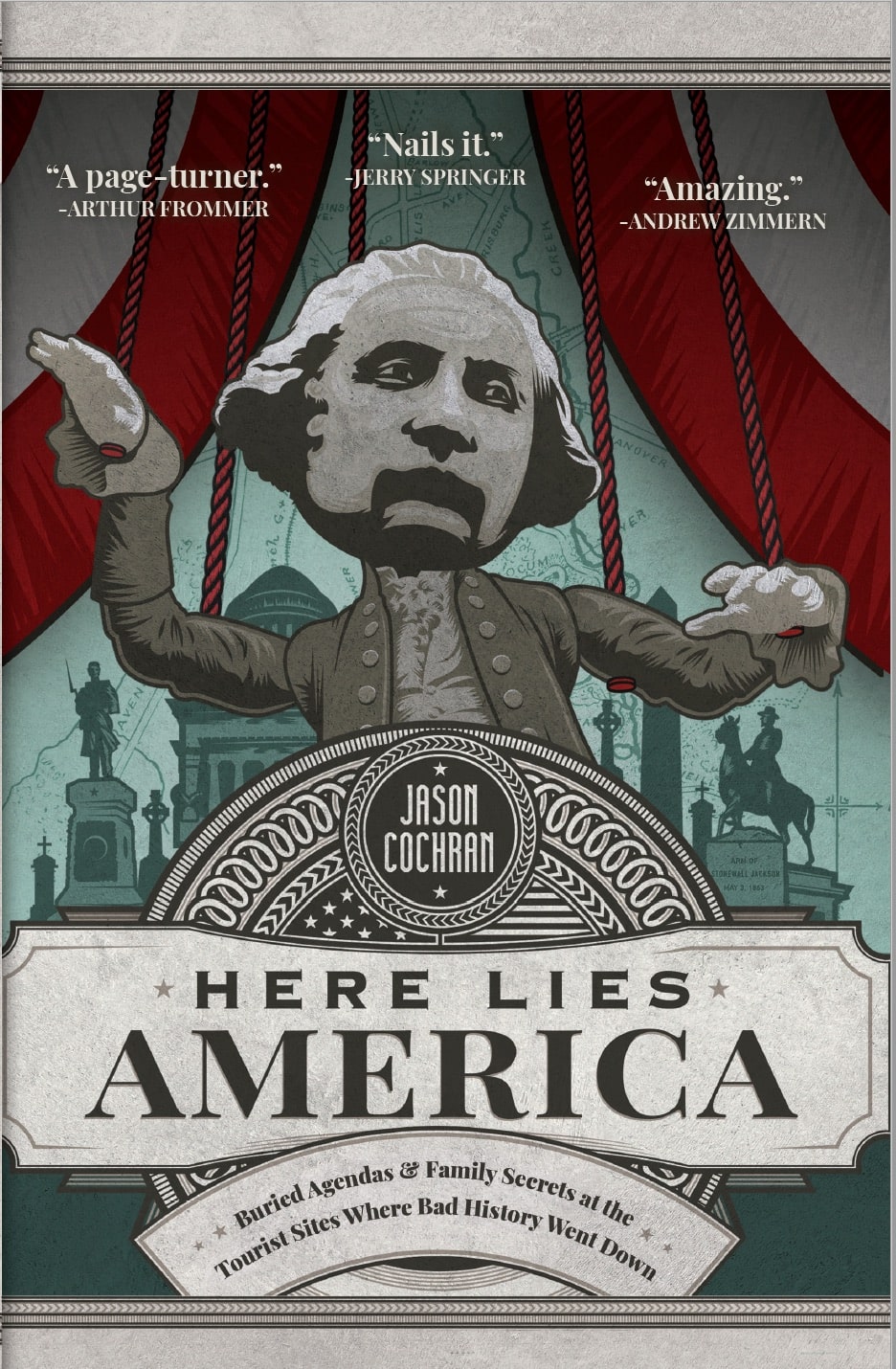 What was one of the most surprising things you learned from your research?
In almost no instance was a plaque, statue, or sign placed right after the historic event in question. Most of the monuments were actually installed many decades after the event. In the case of the Civil War, most of the memorials were erected in a boom that came a half-century after the last bullet was fired.
If you really get close to the plaques and read past the poetic inscriptions, it quickly becomes clear that our most beloved historic sites aren’t sanctified with artifacts but with propaganda placed there by people who weren’t even witnesses to the event. There was a vast network of women’s clubs that would help you order a statue for your own town out of a catalog, and they commissioned European sculptors who cashed the checks but privately grumbled about the poor taste of the tacky kitsch they were installing all over America.
We’re still dealing with what they did today. It’s what Charlottesville was about. But most people don’t realize these statues weren’t put there anywhere near the time of the war, or that they were the product of an orchestrated public relations machine. By powerful women!
What was one of the most surprising things you learned from your research?
In almost no instance was a plaque, statue, or sign placed right after the historic event in question. Most of the monuments were actually installed many decades after the event. In the case of the Civil War, most of the memorials were erected in a boom that came a half-century after the last bullet was fired.
If you really get close to the plaques and read past the poetic inscriptions, it quickly becomes clear that our most beloved historic sites aren’t sanctified with artifacts but with propaganda placed there by people who weren’t even witnesses to the event. There was a vast network of women’s clubs that would help you order a statue for your own town out of a catalog, and they commissioned European sculptors who cashed the checks but privately grumbled about the poor taste of the tacky kitsch they were installing all over America.
We’re still dealing with what they did today. It’s what Charlottesville was about. But most people don’t realize these statues weren’t put there anywhere near the time of the war, or that they were the product of an orchestrated public relations machine. By powerful women!
 I wrote a line in the book: “Having a Southern heritage is like having herpes—you can forget you have it, you can deny it, but it inevitably bubbles up and requires attention.” These issues aren’t going away.
Places we think of as holy ground, like Arlington National Cemetery, often have some pretty shocking origin stories. Arlington started because some guy got pissed off at Robert E. Lee and started buying corpses in his rose garden to get back at him! That’s our hallowed national burial ground: a nasty practical joke, like the Burn Book from Mean Girls. Dig a little and you find more revolting secrets, like how the incredible number of people buried under the wrong headstone, or the time the government put the remains of a Vietnam soldier in the Tomb of the Unknowns. They pretty much knew his identity, but Ronald Reagan really wanted a TV photo op. So they sealed all the soldier’s belongings in the coffin with him so that no one would figure it out.
They eventually had to admit they’d lied and gave the soldier’s body back to his mom. But if a thing like that happens in a place like Arlington, can the rest of our supposedly sacred sites be taken at face value at all?
It goes a lot deeper. At Ford’s Theatre and the surrender house at Appomattox, the site we visit isn’t even real. They’re fakes! The original buildings are long gone but visitors are rarely told that. The tale’s moral is what’s valued, not the authenticity.
What can visiting these sites teach us about how we remember our past?
Once you realize that all historic sites have been cultivated by someone who wanted to define your understanding of it, you learn how to use critical thinking as a traveler. All it takes is asking questions. One of the most fun threads in the book kicks off when I go to Oakland, a historic but touristy cemetery in Atlanta. I spot an ignored gravestone that piqued my interest. I’d never heard of the name of the woman: Orelia Key Bell. The info desk didn’t have her listed among the notable graves. She was born around the 1860s, which was a very eventful time in Atlanta.
So I took out my phone and right there on her grave, I Googled her. I researched her whole life so I could appreciate what I was seeing. It turned out she was a major poet of her time. I stood there reading PDFs of her books at her feet. Granted, her stuff was dreary, painfully old-fashioned. I wrote that her style of writing didn’t fall out of fashion so much as it was yanked down and clubbed by Hemingway.
But reading her writing at her grave made me feel wildly connected to the past. We almost never go to old places and look deeper. We usually let things remain dead. We accept what’s on the sign or the plaque as gospel, and I’m telling you, almost nothing ever reaches us in a state of purity.
I wrote a line in the book: “Having a Southern heritage is like having herpes—you can forget you have it, you can deny it, but it inevitably bubbles up and requires attention.” These issues aren’t going away.
Places we think of as holy ground, like Arlington National Cemetery, often have some pretty shocking origin stories. Arlington started because some guy got pissed off at Robert E. Lee and started buying corpses in his rose garden to get back at him! That’s our hallowed national burial ground: a nasty practical joke, like the Burn Book from Mean Girls. Dig a little and you find more revolting secrets, like how the incredible number of people buried under the wrong headstone, or the time the government put the remains of a Vietnam soldier in the Tomb of the Unknowns. They pretty much knew his identity, but Ronald Reagan really wanted a TV photo op. So they sealed all the soldier’s belongings in the coffin with him so that no one would figure it out.
They eventually had to admit they’d lied and gave the soldier’s body back to his mom. But if a thing like that happens in a place like Arlington, can the rest of our supposedly sacred sites be taken at face value at all?
It goes a lot deeper. At Ford’s Theatre and the surrender house at Appomattox, the site we visit isn’t even real. They’re fakes! The original buildings are long gone but visitors are rarely told that. The tale’s moral is what’s valued, not the authenticity.
What can visiting these sites teach us about how we remember our past?
Once you realize that all historic sites have been cultivated by someone who wanted to define your understanding of it, you learn how to use critical thinking as a traveler. All it takes is asking questions. One of the most fun threads in the book kicks off when I go to Oakland, a historic but touristy cemetery in Atlanta. I spot an ignored gravestone that piqued my interest. I’d never heard of the name of the woman: Orelia Key Bell. The info desk didn’t have her listed among the notable graves. She was born around the 1860s, which was a very eventful time in Atlanta.
So I took out my phone and right there on her grave, I Googled her. I researched her whole life so I could appreciate what I was seeing. It turned out she was a major poet of her time. I stood there reading PDFs of her books at her feet. Granted, her stuff was dreary, painfully old-fashioned. I wrote that her style of writing didn’t fall out of fashion so much as it was yanked down and clubbed by Hemingway.
But reading her writing at her grave made me feel wildly connected to the past. We almost never go to old places and look deeper. We usually let things remain dead. We accept what’s on the sign or the plaque as gospel, and I’m telling you, almost nothing ever reaches us in a state of purity.
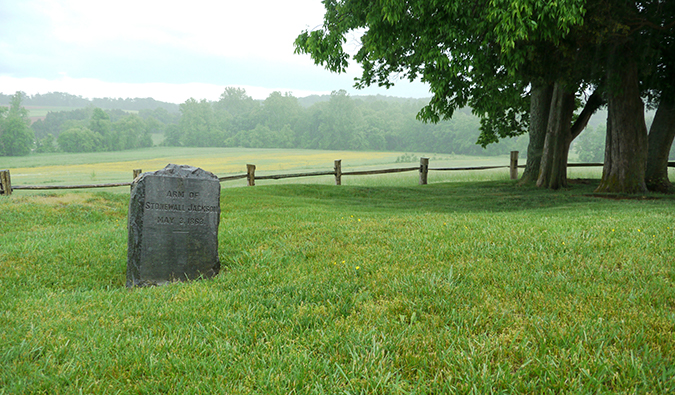 I figured that if I was going to probe all these strangers, I had to be fair and probe someone I knew. I decided to look into an untimely death in my own family, a great-grandfather who had died in a train wreck in 1909. That was the beginning and the end of the tale in my family: “Your great-great grandfather died in a train wreck up in Toccoa.”
But almost as soon as I started looking deeper, I discovered something truly shocking—he had been murdered. Two young Black men were accused in rural South Carolina for sabotaging his train and killing him. You’d think at least someone in my family would have known this! But no one had ever looked into it before!
Here Lies America follows their trail. Who were these guys? Why would they want to kill him? I went to where their village used to be, I started digging into court documents from their murder trial. Let me tell you, the shockers came flooding. Like, I found they may have killed him because they wanted to protect a sacred old Cherokee burial mound from destruction. There was this crazy, larger-than-life forgotten story happening in my own damn family.
My experience with that poet’s grave has a happy coda. Last week, someone told me that Orelia Key Bell and her companion are now officially part of the guided tour of Oakland. The simple act of looking deeper had revived a forgotten life and put her back on the record. That’s what visiting these sites can do—but you have to look behind the veneer, the way I do with dozens of attractions in my book. This is the essence of travel, isn’t it? Getting to a core understanding of the truth of a place.
A lot of what you wrote showed how whitewashed many of these historical sites are. How do we as travelers dig deeper to get to the real history?
Remember that pretty much everything you see at a historic site or museum was intentionally placed there or left there by someone. Ask yourself why. Ask who. And definitely ask when, because the climate of later years often twists interpretation of the past. It’s basic content analysis, really, which is something we’re really bad at in a consumer society.
Americans have it drilled into them to never question the tropes of our patriotism. If we learned about in grade school, we assume it’s a settled matter, and if you press it, you’re somehow an insurgent. Now, more than any other time in history, it’s easier than ever to call up primary sources about any era you want. If you want to go back to what our society really is, if you want to try to figure out how we wandered into the shattered shambles we’re in today, you have to be honest about the forces that created the image that, until recently, many of us believed we really were.
I figured that if I was going to probe all these strangers, I had to be fair and probe someone I knew. I decided to look into an untimely death in my own family, a great-grandfather who had died in a train wreck in 1909. That was the beginning and the end of the tale in my family: “Your great-great grandfather died in a train wreck up in Toccoa.”
But almost as soon as I started looking deeper, I discovered something truly shocking—he had been murdered. Two young Black men were accused in rural South Carolina for sabotaging his train and killing him. You’d think at least someone in my family would have known this! But no one had ever looked into it before!
Here Lies America follows their trail. Who were these guys? Why would they want to kill him? I went to where their village used to be, I started digging into court documents from their murder trial. Let me tell you, the shockers came flooding. Like, I found they may have killed him because they wanted to protect a sacred old Cherokee burial mound from destruction. There was this crazy, larger-than-life forgotten story happening in my own damn family.
My experience with that poet’s grave has a happy coda. Last week, someone told me that Orelia Key Bell and her companion are now officially part of the guided tour of Oakland. The simple act of looking deeper had revived a forgotten life and put her back on the record. That’s what visiting these sites can do—but you have to look behind the veneer, the way I do with dozens of attractions in my book. This is the essence of travel, isn’t it? Getting to a core understanding of the truth of a place.
A lot of what you wrote showed how whitewashed many of these historical sites are. How do we as travelers dig deeper to get to the real history?
Remember that pretty much everything you see at a historic site or museum was intentionally placed there or left there by someone. Ask yourself why. Ask who. And definitely ask when, because the climate of later years often twists interpretation of the past. It’s basic content analysis, really, which is something we’re really bad at in a consumer society.
Americans have it drilled into them to never question the tropes of our patriotism. If we learned about in grade school, we assume it’s a settled matter, and if you press it, you’re somehow an insurgent. Now, more than any other time in history, it’s easier than ever to call up primary sources about any era you want. If you want to go back to what our society really is, if you want to try to figure out how we wandered into the shattered shambles we’re in today, you have to be honest about the forces that created the image that, until recently, many of us believed we really were.
 Do you think Americans have a problem talking about their history? If so, why is that?
There’s a phrase, and I forget who said it—maybe James Baldwin?-but it goes, “Americans are better at thinking with their feelings than about them.” We go by feels, not so much by facts. We do love to cling to a tidy mythology of how free and wonderful our country always was. It reassures us. We probably need it. After all, in America, where we all come from different places, our national self-belief is our main cultural glue. So we can’t resist prettying up the horrible things we do.
But make no mistake: Violence was the foundation of power in the 1800s, and violence is still a foundation of our values and entertainment today. We have yet to come to terms with that. Our way of dealing with violence is usually to convince ourselves it’s noble.
And if we can’t make pain noble, we try to erase it. It’s why the place where McKinley was shot, in Buffalo, lies under a road now. That was intentional so that it would be forgotten by anarchists. McKinley was given no significant pilgrimage spot where he died, but right after that death, his fans paid for a monument by Burnside’s Bridge in Antietam, because as a youth, he once served coffee to soldiers.
That’s the reason: “personally and without orders served hot coffee,” it reads—it’s hilarious. That is our national mythmaking in a nutshell: Don’t pay attention to the place that raises tough questions about imperialism and economic disparity, but put up an expensive tribute to a barista.
What is the main takeaway you’d like readers to take away from your book?
You may not know where you came from as well as you think you do. And we as a society definitely haven’t asked enough questions about who shaped the information we grew up with. Americans are finally ready to hear some truth.
Jason Cochran is the author of Here Lies America: Buried Agendas and Family Secrets at the Tourist Sites Where Bad History Went Down. He’s been a writer since mid-1990s, a commentator on CBS and AOL, and works today as editor-in-chief of Frommers.com and as co-host of the Frommer Travel Show on WABC. Jason was twice awarded “Guide Book of the Year” by the Lowell Thomas Awards and the North American Travel Journalists Association.
Do you think Americans have a problem talking about their history? If so, why is that?
There’s a phrase, and I forget who said it—maybe James Baldwin?-but it goes, “Americans are better at thinking with their feelings than about them.” We go by feels, not so much by facts. We do love to cling to a tidy mythology of how free and wonderful our country always was. It reassures us. We probably need it. After all, in America, where we all come from different places, our national self-belief is our main cultural glue. So we can’t resist prettying up the horrible things we do.
But make no mistake: Violence was the foundation of power in the 1800s, and violence is still a foundation of our values and entertainment today. We have yet to come to terms with that. Our way of dealing with violence is usually to convince ourselves it’s noble.
And if we can’t make pain noble, we try to erase it. It’s why the place where McKinley was shot, in Buffalo, lies under a road now. That was intentional so that it would be forgotten by anarchists. McKinley was given no significant pilgrimage spot where he died, but right after that death, his fans paid for a monument by Burnside’s Bridge in Antietam, because as a youth, he once served coffee to soldiers.
That’s the reason: “personally and without orders served hot coffee,” it reads—it’s hilarious. That is our national mythmaking in a nutshell: Don’t pay attention to the place that raises tough questions about imperialism and economic disparity, but put up an expensive tribute to a barista.
What is the main takeaway you’d like readers to take away from your book?
You may not know where you came from as well as you think you do. And we as a society definitely haven’t asked enough questions about who shaped the information we grew up with. Americans are finally ready to hear some truth.
Jason Cochran is the author of Here Lies America: Buried Agendas and Family Secrets at the Tourist Sites Where Bad History Went Down. He’s been a writer since mid-1990s, a commentator on CBS and AOL, and works today as editor-in-chief of Frommers.com and as co-host of the Frommer Travel Show on WABC. Jason was twice awarded “Guide Book of the Year” by the Lowell Thomas Awards and the North American Travel Journalists Association.

